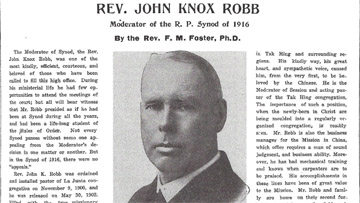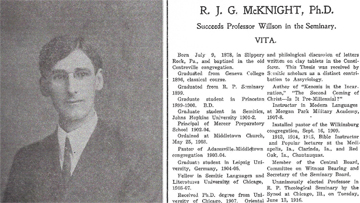Where and When
Synod opened Wednesday morning, June 7, 1916 and ended Tuesday evening, June 13, in the Chicago RP Church. Synod’s practice was to meet from midweek to midweek so delegates would not have to travel on the Sabbath day. Sessions usually were held weekdays for three hours, 9 a.m. to 12 noon and 2 p.m. to 5 p.m.
The 1916 evening sessions were devoted to special topics:
- Wednesday – memorial service;
- Thursday – conference on education;
- Friday – conference on foreign missions;
- Monday – conference of the centennial of the American Bible Society.
The church was located at 65th St. at Evans Ave., pastored by T. C. McKnight. The reported membership of this congregation was 28, but interestingly the Sabbath school had an enrollment of 172. The 1910 census reported that Chicago, the second largest city in the United States, had a population 2,185,283. New York City’s population was 4,766,833, and Philadelphia’s was 1,549,008.
Contemporary Affairs
The Panama Canal was opened for use two years earlier. The President of the United States was Woodrow Wilson. World War I would be declared within a year in April 1917. The American Bible Society celebrated its 100th anniversary.
Traveling in 1916
Delegates arrived by train, as highways and motor vehicles were not yet common. Railroads customarily offered special half fares to the clergy, but laymen could only receive the special rate offered to groups of 10, or travel on mileage. The round trip half rate for clergy delegates from Pittsburgh using the P&LE (Pennsylvania & Lake Erie Railroad) was $17.15 with the advantage of no change of cars, and the rate was $18.75 on the PRR (Pennsylvania Railroad).
The organizer for railroad travel from New York City reported that he had reserved all the lower births on car 3, train 3, which left at 3 p.m. on Monday, June 5, arriving Chicago Tuesday, June 6, at 5:30 p.m. Day coaches were also available on this train for those who did not want a berth. Elders and visitors were encouraged to “join the party”! Round trip fares on the Erie Railroad from New York City were $33.30. Directions were given to the church from several railroad depots in Chicago.
Meals and Lodging
In April there was an announcement in The Christian Nation that the Hotel Del Prado would be available and would give special terms to delegates. It was about a 10-minute electric car ride to the church and was also within a reasonable walking distance. Room-only rates were quoted as either $l.50 or $2.00, and that the daily rate for the American Plan (with meals) was $2.50 and upward.
The editor of The Christian Nation editorialized: “Presumably even the special rates granted to delegates and visitors may seem high, one dollar and a half a day for a room, and two dollars and a half a day for room and meals. But to many who will be in attendance, Synod is their annual outing, and to live for the week at such a Hotel as the Del Prado will add immensely to the pleasure of it, and under such circumstances the cost is more than justified. And of course to any of the delegates the cost is well within their means.”
However, the Republican National Convention was to also meet in Chicago the week of June 7. It was announced in May that all rooms at the Hotel Del Prado had been taken by the delegates to the Ccnvention. Delegates to the 1916 Synod had the distinction of being “bumped” by the Republicans!
It turned out that nearby Hotel Strand, built of concrete, marble, and steel, was available. It was described as the only non-tip hotel in Chicago, and was less than three blocks from the church. Other nearby hotels mentioned were the Grant and the Hayes. Options were announced for lunch rooms and cafeterias in reasonable proximity of the church. Covenanter and private homes were also offered as an option, but there weren’t many accommodations available. A new boarding house was also mentioned, with meals costing 25 cents.
A Special Appeal to the Delegates
The May 31 issue of the Christian Nation admonished delegates not to leave early and rush to get home. This appeal was titled “The Benediction at Synod” by Rev. T. C. McKnight. Excerpts from this notice are: “Did you ever hear it? Are you planning to hear it this year? Synod will be in session until the ‘Amen’ in the benediction is spoken. If three fourths or a half of you come thinking you must get away Monday evening or Tuesday noon, the chances are that about half of the Synod will be trailing over the country when the Benediction is pronounced.… with a great climax!… A delegate’s duty is at Synod until it is closed, unless providentially hindered.”
Roll of Synod
- Ministers – 86.
- Ruling Elders – 55.
- Total on the roll – 141.
- Ministers absent – 51.
- Congregations not represented – 39.
The Opening Session
The retiring Moderator, J. C. French, preached on 1 Kings 18:1, “And it came to pass after, that the word of the Lord came to Elijah in the third year, saying, Go, show thyself to Ahab; and I will send rain upon the earth.” It was appropriate, as rain had fallen in the city since the preceding day, and the morning was cold and wet! The rain continued until Saturday morning. J. K. Robb, missionary to China, was elected moderator by a unanimous and rising vote, and two members of the court were appointed to escort the newly-elected moderator to the chair.
A Priority Session
The first evening session of every Synod was always devoted entirely to a memorial service for ministers and missionaries who had died during the preceding year. Not only were printed memorials read, but various members of Synod prayed and spoke, complimentarily and “at some length.” Three ministers, R. A. Boyd, D. H. Coulter, and J. Boggs Dodds, and one missionary, Miss Mattie R Wylie, were remembered.
A Significant Resignation and Election
The next morning, Thursday, June 8, the following paper was presented by Rev. D. B. Willson, as follows: “Dear Brethren: Thankful to God for His goodness to me during the forty-one years of duty in the theological seminary, I hereby resign my position as professor of theology; and in this connection respectfully ask the same allowance that was given to my predecessor in 1875. Yours respectfully, D. B. Willson.” A motion was made to appoint a committee to discuss this with Mr. Willson, but he replied that he had resigned as a result of his own judgment and did not wish anyone to overcome it. This motion was not acted upon.
An election to replace Willson was held Tuesday morning, June 13. A controversial topic was debated: whether or not to have nominations. Tender and hearty tributes were given to Prof. Willson. Dr. R. J. G. McKnight was nominated and seconded by a number of delegates. Two others received votes: George A. Edgar and T. H. Acheson. Eight members of Synod prayed. The voting process was a moving experience, as reported: “The quiet, the monotonous, the tenseness, the solemnity, and the unuttered prayers that one felt were ascending to the Great Master of Assemblies, affected one strangely.” Rev. McKnight received the majority; therefore the election was made unanimous.
A Visit with President Woodrow Wilson
A committee of the National Reform Association reported on their 15-minute visit with President Wilson on behalf of the Christian Amendment.
Other Business
An effort to revise the Terms of Communion was indefinitely postponed. Sabbath travel was this was left to individual conscience. Discussions included whether a church court discuss taxation, the tithe, and consideration of Hebrew land laws. A collection of about $23.00 was collected to be given to the janitor, mail carrier, typist, etc. Synod discussed whether the periodical Olive Trees should be transferred from being proprietary to denominational ownership. Foreign missionaries who were at Synod were introduced and some spoke. Synod considered selling munitions of war to the allies. An invitation for Synod to visit Sears, Roebuck & Co. was not accepted.
Synod Sabbath
Sabbath school was held at 10 a.m., public worship at 11 a.m., prayer meeting at 3 p.m., and evening worship at 7:30 p.m.
Discussion on Tobacco
An effort to make non-use of tobacco a condition of being received as a communicant member was debated at some length. If approved by Synod, this would be sent down in overture. An inconsistency was pointed out that the proposal did not forbid the use of tobacco once a member joins the church. This initiative was defeated, by division, primarily by the majority taking the view that the Church should forbid the use of tobacco by anyone in the church. One minister, in favor of the initiative, remarked that he “preferred to have the overture defeated by a small majority than to have it adopted by a small majority. When it is adopted, it should be by a large, if not a unanimous vote.”
Next Synod
Five invitations for Synod in 1917 were received from Sterling, Kan.; Seattle, Wash.; Bellefontaine (with Belle Center and Northwood), Ohio; Chicago, Ill.; and from the mayor of Baltimore, Md. Five invitations were uncommon, so the reporter observed: “Synod has been behaving itself so nicely the past two or three years that folks are actually want us!” Chicago wanted Synod to meet there permanently. Bellefontaine’s bid stated that “Bellefontaine was a dry town, good hotels, and the center of several railroad systems.” Sterling claimed that it “was the center of the earth” and offered free lodging. Seattle, not to be undone, also offered free lodging. Synod had to make two rising votes, and Sterling won.
Closing
At 9 p.m., Psalm 133 was sung and Synod was adjourned. A noticeably larger proportion of the entire number of delegates rose to sing, probably as a result of the admonition for delegates to stay until the end, but a number of delegates brought their baggage with them to the closing!
Author John M. Mitchell is a volunteer for the RPCNA archives; clerk of session at Rose Point (New Castle, Pa.) RPC; and associate professor emeritus of business administration at Geneva College.
REFERENCES: Minutes of Synod, 1916; The Christian Nation, 1916, Volumes 64 & 65


